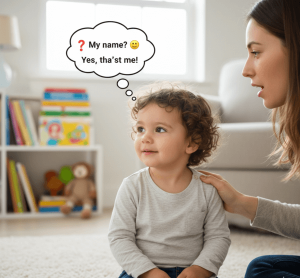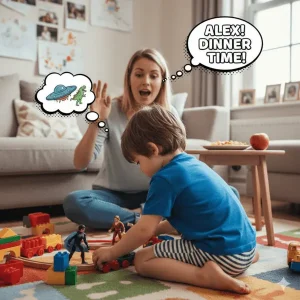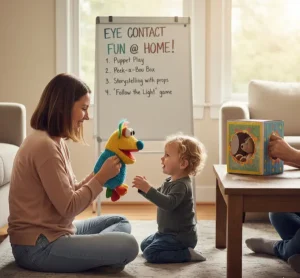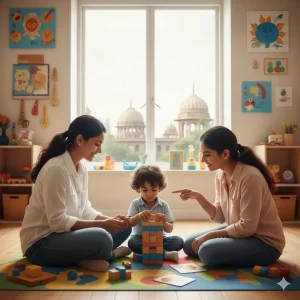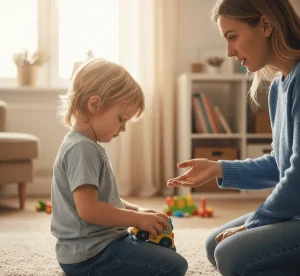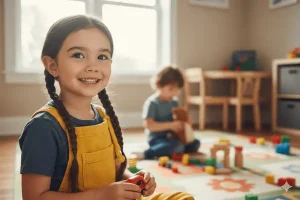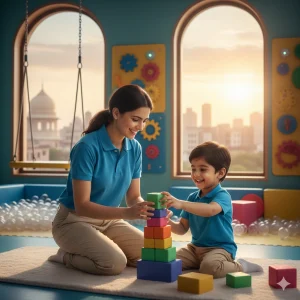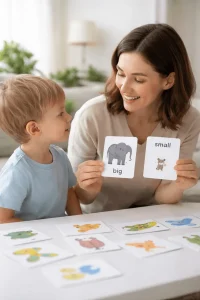Why isn’t My Toddler Recognizing Faces or Objects? Find Out Now
Last Updated: June 12, 2025
Is your toddler not recognizing familiar faces or their favorite toys — even the ones they used to love?
If you’ve ever paused and thought, “Is this normal?” — you’re not alone. Many parents find themselves questioning whether their child is meeting key milestones, especially when it comes to recognizing people, responding to their name, or showing excitement for familiar objects.
While every child develops at their own pace, some early signs can indicate when it’s time to seek a little extra support. In this guide, we’ll break down what’s expected, what to look out for, and simple ways to help your toddler at home.
If you’re noticing early signs that concern you, don’t wait — book an autism therapy session with our experts today and take the first step toward clarity and support.
What’s Typically Expected: Developmental Milestones
In the first two years of life, your toddler’s brain is making incredible connections every single day. During this time, it’s natural to wonder, “Is my child picking up on familiar faces and favorite toys like they should?”
Most toddlers between 12 and 24 months begin to show exciting signs of recognition and communication. Here’s what you can typically expect to see:
| Age Range | Developmental Signs |
|---|---|
| Around 12 months | Smiles at familiar caregivers and may reach out for them |
| 12–18 months | Points to familiar objects when named (like a ball, cup, or pet) |
| By 12 months | Responds to their name most of the time |
| 12–18 months | Uses simple gestures like waving “bye-bye” or nodding |
| By 18 months | Says a few recognizable words like “mama,” “dada,” or names of toys |
| 18–24 months | Shows clear preference for favorite people, toys, or activities |
Read More: Speech Development Milestones: Your Child’s Talking Journey
When to Be Concerned
While every child develops at their own pace, there are times when a closer look can be helpful. Trusting your instincts is important — and seeking advice early can make a world of difference.
You might consider speaking with a professional if your toddler:
- Does not consistently respond to their name by 12 months
- Shows little or no recognition of familiar people or favorite objects
- Rarely or never uses gestures (like waving, pointing, or clapping)
- Avoids eye contact or seems unaware of the people around them
- Is not saying single words like “mama” or “ball” by 16 months
Remember, missing one milestone isn’t always a cause for immediate worry. But if you’re noticing a combination of these signs — or if something just doesn’t feel quite right — it’s a good idea to check in with a professional who understands child development.
What You Can Do at Home
If you’re noticing that your toddler isn’t quite recognizing familiar faces or objects as expected, don’t worry — there’s plenty you can do at home to support their development. Little changes and consistent efforts can go a long way in helping your child connect with the world around them.
Here are some simple, powerful ways to encourage recognition and communication skills:
- Narrate Your Day:
Talk to your toddler about what you’re doing throughout the day. As you go through routines, name the actions:
“Now we’re putting on shoes!” or “It’s time for lunch!” This helps your child start making connections between words and actions, and it creates a sense of predictability. - Read Picture Books:
Reading together is one of the most effective ways to encourage recognition and language development. Point to objects in the pictures and name them: “Look, a dog!” or “Here’s your favorite ball!” The more you engage with them during story time, the better they’ll grasp the concept of identifying familiar things. - Use Gestures:
Gestures like waving “bye-bye” or clapping hands while speaking can help your toddler associate movements with words. For example, when you say “Wave bye-bye!”, they’ll start to understand that waving means saying goodbye. - Encourage Imitation:
Toddlers love to imitate! You can turn everyday activities into fun games by encouraging your child to copy your actions and sounds. Whether it’s pretending to brush your teeth or making animal noises, imitation is a key way children learn about the world around them. - Create Routine Moments:
Repetition is key when it comes to building recognition. Try to repeat daily activities at the same time each day — like singing the same song before bed or playing with the same toy at certain moments. The more predictable your child’s world is, the easier it will be for them to recognize what’s familiar and meaningful to them
Learn More: Want clarity about your child’s behavior? Try our quick and free autism screening tests to get expert-backed insights.
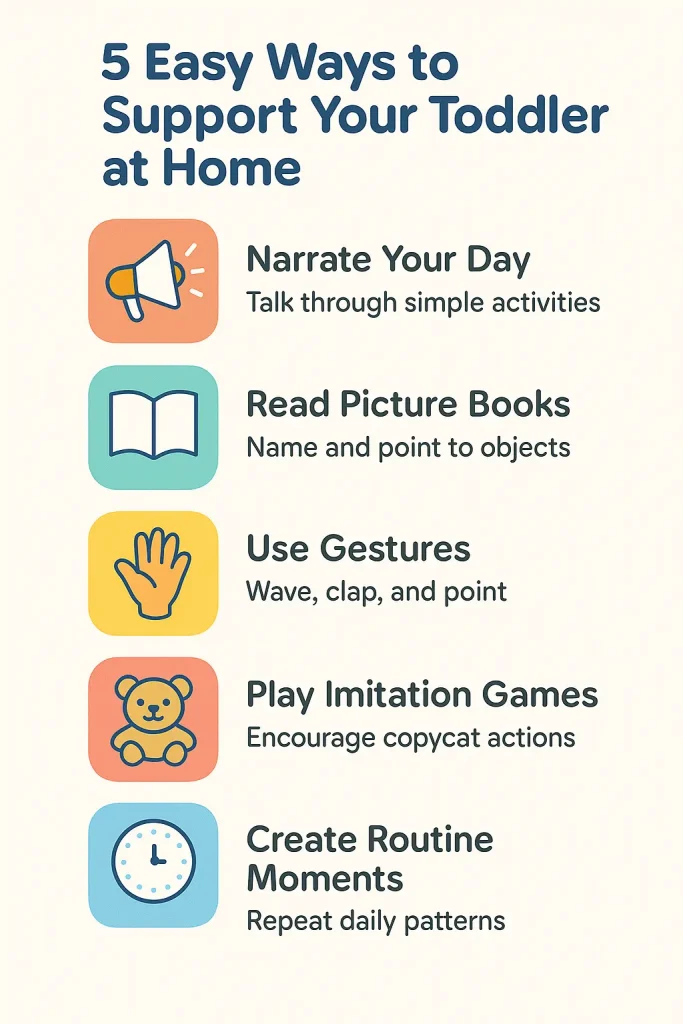
Gentle Encouragement
It’s important to remember: every child grows at their own pace — and that’s perfectly normal. Some toddlers might be early talkers or fast at recognizing faces and objects, while others may take a little more time. Both are okay.
If you’re noticing differences in your child’s development, seeking guidance early is not something to feel worried about. Reaching out for support is a sign of strength, not a sign of failure. In fact, early support often opens the door to quicker progress and more confidence for both you and your child.
Conclusion
If you’re feeling unsure about your child’s development, you’re not alone — and help is just a click away. At Wellness Hub, we offer free consultations, a simple development checklist, and a quick BASICS developmental screener to guide you. There’s no pressure — just clear advice, expert support, and a caring team ready to walk this journey with you. Early help can make a big difference, and trusting your instincts is the first step. Learn more about speech therapy for toddlers and how we can support your child’s growth with simple, personalized care.
Frequently Asked Questions:
1. Is it normal if my toddler doesn’t recognize familiar faces?
It can be normal for some toddlers to take a little longer to recognize familiar faces, but if your child shows no signs of recognition by 12–18 months, it’s a good idea to talk to a professional.
2. When should I worry if my toddler doesn’t respond to their name?
If your toddler is 12 months or older and doesn’t respond to their name most of the time, it could be a sign of a delay. Early support can make a big difference.
3. What are the signs of developmental delay in toddlers?
Some signs include not recognizing familiar faces, not pointing to things, not using gestures like waving, avoiding eye contact, and not saying simple words by 16 months.
4. Can a toddler outgrow not recognizing people?
Some toddlers may catch up on their own, but if your child is not recognizing familiar people or objects by 18–24 months, early help through therapy can really support their growth.
5. How can I help my toddler recognize faces and objects at home?
You can help by narrating daily routines, reading picture books, using gestures like waving, playing imitation games, and keeping daily activities consistent.
6. What could cause a toddler to not recognize familiar faces?
Possible causes include delays in speech and language development, autism spectrum disorder, hearing issues, or other developmental concerns. An early check-up can give clarity.
7. How do I know if my toddler has a speech delay?
If your child is not saying single words like “mama” or “ball” by 16 months, not using gestures, or not responding to simple requests, they may need a speech evaluation.
8. Does online speech therapy work for toddlers?
Yes, online speech therapy is very effective for toddlers. It offers one-on-one, personalized sessions with licensed therapists, making it easy for parents and children to get support from home.
9. Can I help my child at home without therapy?
Yes! Talking, reading picture books, using gestures, encouraging copying games, and keeping a regular routine can all boost your child’s recognition and communication skills.
10. Where can I find a simple checklist to track my toddler’s development?
You can download our free Development Checklist here to easily track your toddler’s milestones and see if extra support might help.
About the Author:
Shilpa Deshpande
Shilpa Deshpande is a skilled speech-language pathologist with over 14 years of experience. Fluent in Kannada, Telugu, Hindi, and English, she specializes in parent counseling, speech sound disorders, fluency assessment, and speech-language evaluations. Shilpa excels at working with children with developmental disorders, offering creative and effective therapy programs. Currently, at Wellness Hub, she holds a BASLP degree and is registered with the RCI. Her patience, ambition, and dedication make her a trusted expert in her field.
Book your Free Consultation Today
Parent/Caregiver Info:
Client’s Details:
* Error Message


